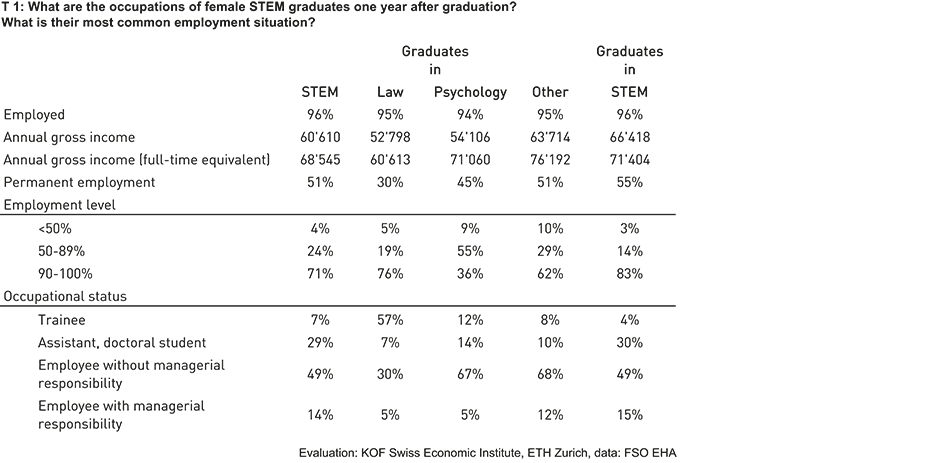
What is the employment situation of female graduates who have studied STEM subjects?
Compared with female graduates in fields such as law and psychology, female STEM graduates have higher salaries one year after graduation, are more likely to have permanent jobs and are more likely to hold managerial positions. Even five years after graduation, four out of five female STEM graduates are in jobs that require a degree in their specialist field. Overall, female STEM graduates seem satisfied with their employment situation.
In 2021, only 26% of Master's degrees were awarded to female students in STEM fields
Workers with qualifications in science, technology, engineering and maths (STEM) play a key role in a computerised knowledge economy, and jobs in these fields are considered particularly attractive. Nevertheless, far fewer women than men complete a Master’s degree in one of the STEM subjects today. Most Master’s degrees obtained by female students are in law, psychology and medicine. Only 26 per cent of the Master’s degrees completed by female students in 2021 were in STEM subjects. This figure was 47 per cent for male graduates (Swiss Federal Statistical Office SHIS 2022).
A previous Bulletin article on gender differences in STEM subjects (2020/10 issue) analysed various educational factors explaining the lower proportion of women in STEM. This article now focuses on possible causes in the labour market and addresses questions such as: What is the employment status of female graduates in STEM subjects? Could it be that there are fewer female STEM graduates because their employment situation is worse than that of male STEM graduates and female graduates in other subjects?
This analysis is based on a external pagesurvey of university graduates (EHA) conducted by the Swiss Federal Statistical Office (FSO), which asks all graduates about their employment situation one and five years after graduation. The evaluations used are based on the initial surveys conducted in 2015, 2017 and 2019 and on the second survey conducted in 2021 (first wave in 2017). The response rate for the first wave is 60 per cent on average and for the second wave is 65 per cent of the responses received from the first wave. All evaluations focus on the employment situation of graduates with a Master’s university degree and are based on the responses of approximately 3,000 female STEM graduates and a total of 23,000 graduates. All responses are weighted in order to achieve representative results.
96 per cent of female STEM graduates are in work one year after graduating. There are very few differences between the various disciplines here. The five most common occupations are academia and higher education; architecture and interior design; pharmacy; biology; and engineering.
Female STEM graduates earn an average of 60,000 Swiss francs per year, which is higher than the incomes of female law and psychology graduates but lower than the average gross income of male STEM graduates. 71 per cent of female STEM graduates work full-time, but part-time jobs are also common. Almost one in four female graduates in a STEM subject works between 50 per cent and 89 per cent of a full-time job.
Just under 30 per cent of STEM graduates start a doctorate immediately after completing their Master’s degree. At the same time, 14 per cent of female STEM graduates are already in managerial roles one year after graduating, which is far more than graduates in other subjects.
Graduates in STEM subjects find employment relatively easily. On average they only have to apply just under 15 times to find a job, which is less than graduates in other subjects.
At the same time, 60 per cent of female graduates claim that they have had difficulty finding a job that meets their personal expectations. This is similar to the experience of female graduates in other subjects and actually lower than that of male STEM graduates. It should be emphasised, however, that around 10 per cent of female graduates – across all subject areas – claim that these difficulties are related to their gender. Only 2 per cent of STEM graduates mention similar difficulties.
69 per cent of female STEM graduates would choose the same degree course again in retrospect, which is 7 percentage points less than male STEM graduates.
Female STEM graduates seem to be satisfied with their employment situation one year after completing their Master’s degrees. Compared with female graduates in other degree subjects, their level of satisfaction with their incomes in particular is higher, as is their satisfaction with the opportunities available for advancement and continuing professional development. Their work/life balance and working environment are also rated fairly positively. 81 per cent of female STEM graduates are either satisfied or very satisfied with their working environment. Nevertheless, there are differences among graduates. Corresponding to the responses about the application process, female STEM graduates seem to be slightly more dissatisfied overall with their employment situation than male STEM graduates.
Female STEM graduates seem to have positive employment situation
96 per cent of female STEM graduates are in work five years after graduation, 67 per cent of whom are employed full-time. Although far fewer female STEM graduates have full-time jobs than male graduates, their proportion is fairly high compared with female graduates in psychology and other subjects.
In contrast to their incomes one year after graduation, the incomes of female STEM graduates are lower than the incomes of female law graduates. Somewhat surprisingly, the incomes of female STEM graduates – standardised to full-time equivalents – are also lower than the incomes of graduates in other disciplines.
79 per cent of female STEM graduates report that a degree in their own subject is necessary for their jobs, which is slightly higher than the proportion for most other fields of study.
Based on this simple descriptive analysis, it appears that female STEM graduates are in a fairly encouraging employment situation overall after graduating with a Master’s degree, differing slightly from male STEM graduates and other female graduates.
STEM subjects and computerisation
Workers with qualifications in science, technology, engineering and maths (STEM) are in high demand in the labour market. The annual external pageSkills Shortage Index published by the University of Zurich and the Adecco Group (in German) shows that companies are eager to recruit STEM professionals – especially as a result of computerisation, which has received a further boost from the COVID-19 pandemic. The latest rankings from summer 2021 reveal that occupational groups in the fields of engineering, IT and technology have the greatest shortages of skilled workers.
Contact
KOF FB Konjunktur
Leonhardstrasse 21
8092
Zürich
Switzerland




